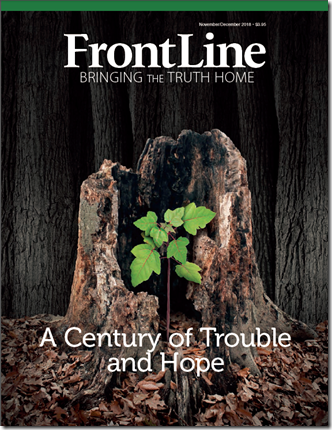November/December 2018 | VOLUME 28 | NUMBER 6
He increaseth the nations, and destroyeth them: he enlargeth the nations, and straiteneth them again. He taketh away the heart of the chief of the people of the earth, and causeth them to wander in a wilderness where there is no way. Job 12:23–24
The year 1919 held great importance for the world. In a sense it was a year in which significant parts of the world “restarted.” It was a year of a global reset.
The year began with the Paris Peace Conference, which sought to make the world a better place forever in the aftermath of the Great War, and in so doing redrew the map of Europe. The Austro-Hungarian empire came to an end. German aggression was curtailed (or so the leaders thought), and Serbian aspirations were stifled. Czechoslovakia and Yugoslavia were created, and a new world order was instituted with the US, France, and the UK at the forefront. The Ottoman Empire saw its end, the Middle East was about to be redefined, and even countries such as Belgium and Denmark received distributions of land. The League of Nations was established, and some of Woodrow Wilson’s dreams of nirvana on earth and self-determination for all peoples seemed to be poised for realization with the path to world peace within the grasp of mankind.
At the world’s new starting point, lingering concern for empires contributed to the attraction of the workers’ paradise of communism as well as the fascism of Mussolini as nations grappled with the best ways of implementing their versions of democracy. Of course, the US model was attempted by a number of countries with 1919 seeing variations on that theme begun in several nations. The time period beginning after the war saw voting rights expanded in many places, including the US. A sense of nationalism that spread to many places in the world had its seeds in the aftermath of the war as well, and even the British Empire, though apparently strengthened between 1914 and 1918 (with the exception of the Ireland matter) would ultimately begin to crumble in the early 1920s.
The year 1919 even saw the beginning of the aftermath of the Spanish Flu Pandemic of 1918, which seemed to dissipate by the beginning of 1919 after causing millions of deaths and impacting millions more throughout the world.
Back at home here in the US, when we weren’t putting Europe in order and observing shifts in political formats as far as Russia, we were busy making improvements where necessary to perhaps becoming a “more perfect union.” The 18th Amendment to the US Constitution was ratified. With it came the anticipation of even greater purity among Americans with the scourge of alcoholic drink excised from the greatest nation. The aftermath of the Great War was certainly a time of upheaval and great consequence in the history of the world. The optimism that was part of the beginning of the new chapter in the world sought justification in the years to come in the hope that it would be proven to have been well placed. It would not be. The results of the Paris Conference did not last. The events of World War II, challenges and conflicts with communism, the proven failure of fascism (and socialism for that matter), the end of Yugoslavia, frequency of war, and continuing problems in the Middle East are just a few examples of the failed legacy of a most notable year.
Hindsight shows us clearly that the idealism and optimism following the war to end all wars and the efforts made to ensure success of the hopeful have proven to be misguided at best. Looking back over the past century shows us that there truly is nothing new under the sun, man is still a sinner by nature, and the only way or place to find nirvana is to trust and believe by faith on the Lord Jesus Christ and be saved. Heaven is the only place to find an end to war, disease, famine, and sin. Human attempts in this world actually prove the point because they will never succeed. We are no closer to perfection now than one hundred years ago or one thousand years ago or in Eden. What does this tell us about the future?
The articles presented in this issue of FrontLine seek to highlight just a few aspects of these truths as seen over the last century, with a focus on Israel, which remains at the center of world events today as it was a hundred years ago—and will be until the end of this age.
Craig Hartman
FEATURES
A Centennial Retrospect
Robert Vincent
As we gaze backward, God would have us be both chastened and hopeful.
Drugged to Death: From Prohibition to Permission
Chuck Phelps
While fewer voices speak up against America’s vices, we are becoming a nation of addicts.
1919, 2019, and Israel— Oh, Happy Day (for Now)!
Craig Hartman
The year 1919 was one of the most consequential years relating to the modern State of Israel.
The Article Gone Wrong: 1919 and the Origins of the Holocaust
Grant Z. Hartman
One often wonders how world events got to the point where Hitler was able to seize power so quickly and decisively.
Jews to America: A Migration That Made a Difference
Stephen Christopher
America offered complete religious freedom, a nearly complete absence of anti-Semitism, and freedom from fear.
Thankfully, Some Things Just Never Change
Jim Bickel
We can safely conclude that God always has and always will love Israel.
Book Review: David Beale’s Historical Theology In-Depth
Robert Vincent
Hope amidst Horror
Stephanie Kanoun
DEPARTMENTS
Mail Bag & News from All Over
On the Home Front
Wit & Wisdom
David Atkinson
How Can I Decide What Is Right for Me?
David C. Innes
Regional Reports
Notable Quotes
Robert Condict
On Language & Scripture
Mark L. Ward Jr.
At a Glance Studies in Isaiah—An Ancient Prophecy with Modern Relevance
Layton Talbert
Cultural Assimilation: Learning the Language of the Babylonians
CDR Tavis J. Long, CHC, USN
LCDR Trenten W. Long, CHC, USN
Grant unto Thy Servants Boldness
Jerry Sivnksty
Click here to subscribe to the magazine.


Comments